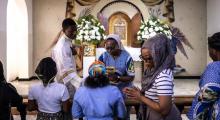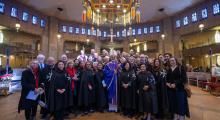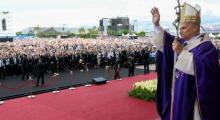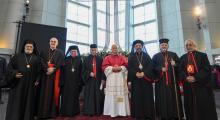Issued by the Catholic Center for Studies and Media - Jordan. Editor-in-chief Fr. Rif'at Bader - موقع أبونا abouna.org
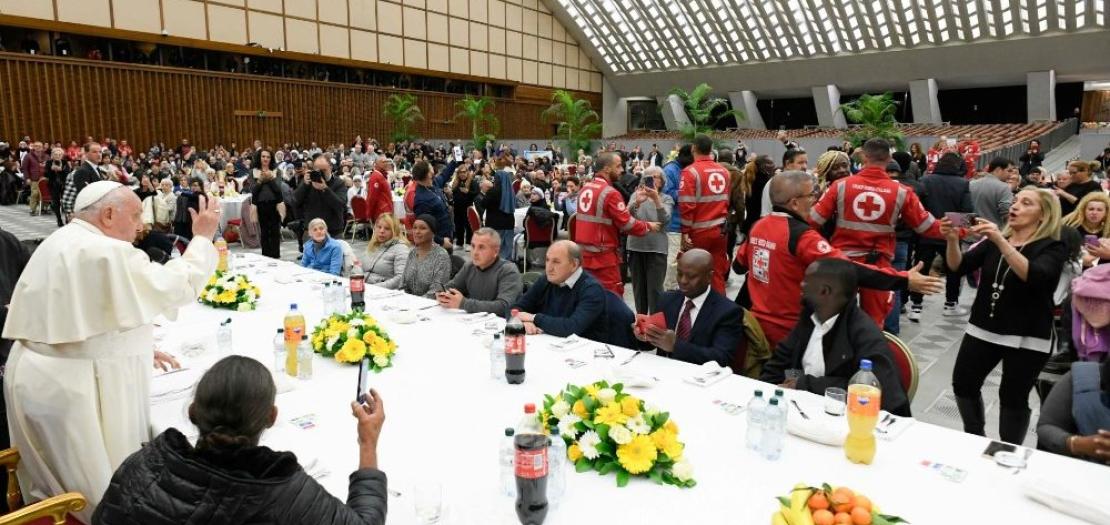
During the lunch for 1,300 people from around the city in need of assistance, Pope Francis expressed his gratitude to all those in dioceses and parishes around the world who have undertaken initiatives of solidarity with the most disadvantaged. The special lunch for 1,300 guests welcomed by Pope Francis was offered by the Italian Red Cross with around 340 volunteers serving the meal.
During the Angelus, just before the lunch began, Pope Francis recalled that this Sunday 17 November marks the World Day of the Poor, with this year's theme "The prayer of the poor rises up to God." And he said we can all ask ourselves these questions: "Do I go without something in order to give it to the poor? When I give alms, do I touch the hand of the poor person and look him or her in the eyes? Brothers and sisters, let us not forget that the poor cannot wait!"
Cardinal Konrad Krajewski, the Papal Almoner and Prefect of the Dicastery for the Service of Charity, which organised the banquet, explained to the Vatican's media why Pope Francis never tires of repeating this annual gesture: simply to follow the example of Jesus, "to restore dignity to people." Rosario Valastro, president of an association that distributes products and food parcels daily to help the homeless in response to the needs and requirements of so many people, emphasizes the value of the beauty that lies in simple things and small gestures. "May their living on the margins of society, in solitude, not make them invisible to our eyes, nor erase their human dignity."
The lunch, enlivened by the national Red Cross fanfare, included a menu of lasagna with vegetables, beef meatloaf stuffed with spinach and cheese, mashed potatoes, fruit, and dessert. At the end, each person will be given a backpack offered by the Vincentian Fathers (Congregation of the Mission), containing food and personal hygiene products.
Today also marks the culmination of the efforts made by the Dicastery for Evangelisation over the past week, which has provided for the needs of the neediest with various charitable initiatives, including, the payment of bills for the neediest families through contacts with parishes. This initiative was made possible through the traditional generosity of Italy's UnipolSai insurance company. The Madre di Misericordia (Mother of Mercy) outpatient clinic that works with the Dicastery to support those living in precarious conditions closed last night with "a river of charity," its director Massimo Ralli noted, "thanks to the many volunteers who have made it possible to welcome and visit almost 1,000 poor people this week."
At the same time, all parish and diocesan communities have responded to the invitation to place the needs of the poor in their neighborhoods at the centre of their pastoral activities through concrete gestures of solidarity. Caritas Italiana, Italy's national Catholic charities, published the 28th edition of the Report on Poverty and Social Exclusion in Italy titled, "Blades of Grass in the Cracks. Responses of Hope" presented as part of the first synodal assembly of the Churches in Italy, which closed on 17 November at the Basilica of Saint Paul's Outside the Walls. Today in Italy 9.7 per cent of the population lives in poverty, practically one person in ten. In all, there are 5,694,000 living in absolute poverty making a total of over two million 217 thousand families (8.4 per centof households). This figure, which is slightly higher than in 2022 on a family basis and stable on an individual basis, is still the highest in the historical trend and does not show signs of decreasing.
On the other hand, reflecting on the apocalyptic imagery from the Gospel reading of the day, taken from Mark's Gospel, Pope Francis opened his homily on the World Day of the Poor on Sunday 17 November by acknowledging the deep feelings of anguish that resonate today. The text reads: “The sun will be darkened, the moon will not give its light, and the stars will be falling from heaven". This, to Pope Francis, reflects the pains of our world - famine, war, inequality, and the indifference that follows.
The Pope warned that in a world in which social media amplifies fears and insecurities it is easy to succumb to despair. Resigning in this way can, in turn, lead to us being robbed of the ability to see God's hand at work, which can transform our faith into what Pope Francis described as "a harmless devotion", that neither moves nor inspires meaningful charity.
However, the Pope continued, it is precisely in darkness that God draws near as "just when everything seems to collapse, God comes, God gathers us together to save us.” Jesus, through his death and resurrection, turned the darkest moment of human history into the dawn of salvation, explained the Pope.
Pope Francis then referred to the image of the fig tree budding in the springtime. With this in mind he urged the faithful to look for signs of hope, even in the harshest realities. The Lord's presence among the poor and suffering, he continued, reminds us that “where there seems to be only injustice, pain, and poverty, the Lord draws near to free us.”
The job of Christ’s disciples, Pope Francis explained, is to make this hope visible. Through acts of justice, solidarity, and charity, we each can become “signs of the Lord’s presence,” showing that he is close to all those who suffer.
Bringing his homily to a close, Pope Francis reminded the faithful that change begins with small, daily actions. Whether in how we live, how we care for our environment, or how we share our resources, each act of compassion can become a sign of hope. "And I say this to the Church, I say it to the Governments, I say it to the International Organizations, I say it to each and every one: please," concluded the Pope, "Let us not forget the poor".



